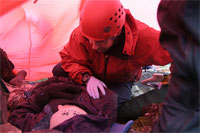One of the few benefits of traveling across the country is that I can catch up on some reading during the flight, and I was particularly taken by an Andrew McCarthy piece in the National Geographic Adventure magazine, this month. “Going Back In” is about a teenage girl who drowns in the South Buffalo Fork of the Snake River during an adventure camp, and McCarthy coming to terms with the guilt surrounding the tragedy.
McCarthy does a great job of capturing the essential juxtaposition of developing leadership and independence in our children, while attempting to protect them from the dangers of the outdoors.
“Katy’s death went to the core of the school, because it wasn’t some random accident. It happened while attempting to apply everything the school teaches and encourages – students making their own decisions…” – Gary Cukjati, Instructor
This issue is particularly personal for me, because I have friends in Oregon who lost their teenage son to a river, in the summer of 2007. Guilt casts a wide net; the parents who let their sons swim in a river as they had done numerous times before, a younger brother who couldn’t save his older sibling, friends who weren’t there but could have been, and friends on the fast water rescue team who had to recover someone they had watched grow up.
There is a fine line between fear and respect, but both make us slow down and consider the ramifications of a potentially dangerous situation. As adults, we base our respect on the lessons of experience, but for our children it is more conceptual and difficult to grasp. Without the opportunity to learn from experience, though, our children cannot fully-develop a healthy respect for the outdoors and learn to minimize risk.
We deal with risk every day, from riding in a car to crossing a busy street. We can reduce risk by wearing seatbelts and looking both ways, but we can only reduce it – not eliminate it, altogether. Swimming, hiking and climbing in the outdoors is inherently less risky than many of our everyday activities, but less risk is not no risk and this is one of the greatest lessons we can teach our children. The risk of not doing so is a lifetime of guilt.
See also…


VDF – hey! sorry I haven’t been around, lately, it’s just been a busy summer. Glad to hear campingforums.com is doing well, and I’ll be sure to get back over there soon.
Always on the side of caution when out in the woods. And if in bear country double the caution is a better idea and if your sport is more challenging than just walking or backpacking then triple the caution. Like an earlier poster I have had friends die doing what they thought they loved to do. If they had known the outcome of the actions that sent them to the other side of life, would they have been more cautious? I would like to believe that they would have been more careful and chosen to stay in this life for as long as possible!
Howdy Roy,
It’s been some time, and I was just thinking where are you and how you are doing? So I went and looked you up. I’m a mod now at campingforums and so have a little voice about 1%. I’m still liking what I’m seeing you doing. So how is that going? Let me know if I can help. Sure could use your expertise from northern CA since we have picked up a few campers from the Bay and points north.
Cheers, VDF
John – right, that is the challenge.
Nancy – I don’t envy you at all! I bet it’s such a relief after graduation, just from the stress standpoint.
For eight years now Virginia State Parks has hosted youth aged 14-17 with mostly college aged supervisors in our Youth Corps summer programs. I spend six weeks each summer worrying about some catastrophic event happening to any one of the participants. It is a work and fun program and while we stress safety at all levels, there is no way to guard against an accident. Last weekend, after our second session graduation I took a deep breath and knew I was off the hook for another year.
Very well put Roy. It’s not easy to determine how protective we should be of others, in this case kids and teenagers. I, too, know people who have died in the outdoors, and some of the deaths could have been prevented with proper knowledge and skills.
In my outdoors writing, I lean strongly on the side of caution.